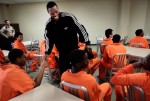https://twitter.com/AlgebraPoints/status/399411742192590848
https://twitter.com/AlgebraPoints/status/399421329570398208
ALL WE NEED IS TO BRING CONFLICT RESOLUTION TRAINING SKILLS INTO THE CLASSROOM
MEASURING TRIANGLES OUR FAVORITE THING
The Algebra Project
Marvin Gaye asked “What’s Going on”
Children in Prison Industry
In the beginning stages of Vernon’s incarceration it was hard especially being only sixteen amongst grown men, murderers, gang bangers and robbers. It wasn’t no Disneyland, but he made it and as they say “Only the Strong Survive” and he’s done just that…..Survive!
From Jr. High School to #PrisonIndustry
Born in Los Angeles, California Vernon Steward was a young active go hard in the paint type of juvenile. He started writing as a hobby, really just the lyrics of his own raps. He always was inspired by 2Pac and his wisdom and his big cousin taught him a few things too. After getting in some trouble and going to prison so young Vernon realized it was a major blow to himself and his family. However while being incarcerated He grew up to be a man, a great man, an intelligent young black man at that!Vernon’s writings didn’t begin until he started his struggle day in and day out using it as a form of positive release. It wasn’t until later that he realized he could really do something with it, and being incarcerated did not always have to be the end. Incarceration at an early age for most may have been the end of the road. However Vernon used life’s lessons as inspiration and motivation to put a pen to a piece of paper and allow his own thoughts and experiences to flow making for incredible pieces of literary greatness.
CASH FOR KIDS
Children taken away too soon; Many times forever USA #PrisonIndustry
Closing the PipeLine
The United States #PrisonIndustry stands alone worldwide in imposing sentences of life without parole on juveniles. The U.S. achieved this unique position by slowly and steadily dismantling founding principles of the juvenile justice system. Today a record number of people are serving juvenile life without parole (JLWOP) sentences in the U.S. for crimes committed before their 18th birthday. Sentences of life without parole are often erroneously believed to translate to a handful of years in prison followed by inevitable release. The reality is that a life sentence for a child without parole means that the Baby will die in prison. Copyright @ 2012 by The Sentencing Project. Reproduction of this document in full or in part, and in print or electronic format, only by permission of The Sentencing Project
Mississippi is a state long recognized for it’s systemic and systematic racism and bigotry, particularly towards Black Americans.
The findings by theMississippi Department of Justice expose this latest case of Jim and Jane Crow-ism to the world with its findings that Black students were being disproportionately targeted for a ‘School to Prison’ pipeline.
The Equal Justice Initiative reports:
Meridian police automatically arrest public school students when called by school officials, often without determining if there is probable cause. Students are then put on probation, sometimes without proper legal representation, and are required to serve any subsequent suspensions from school in the juvenile detention center.
The system has led to students being incarcerated in the detention center for dress code violations, flatulence, profanity, and disrespect.
“The students most severely affected by these practices are black children and children with disabilities in Meridian,” the Justice Department said in a letter to Mississippi’s governor, attorney general and various officials in Meridian and Lauderdale County.
“These entities, working in conjunction, help to operate a school-to-prison pipeline that routinely and repeatedly incarcerates children for school disciplinary infractions,” the letter alleged.
If the matter isn’t corrected soon, the Department has said it will sue the Lauderdale County Youth Court, the Meridian Police Department and the Mississippi Division of Youth Services, a division of the state Department of Human Services.
This article was written by JG Vibes and originally published at The Intel Hub
On Wednesday civil rights lawyers filed a lawsuit against the local government of Meridian, Mississippi, and other defendants for operating what has been called a school-to-prison pipeline in which students are denied basic constitutional rights, sent to court and incarcerated for minor school infractions.
The lawsuit says children who talk back to teachers, violate dress codes, and commit other minor infractions are handcuffed and sent to a youth court where they are denied their rights.
According to CNN:
“Also among the defendants were Lauderdale County, judges of the county’s Youth Court and the State of Mississippi Division of Youth Services.
About 6,000 mostly African-American students attend grades kindergarten through 12 in a dozen schools in the Lauderdale County School District.
Deputy Assistant Attorney General Roy Austin said Wednesday that Mississippi officials had failed to cooperate with the eight-month investigation.
“We had no choice but to file suit,” Austin said, giving examples of what he alleged are unconstitutional actions taken by the school district and court which include:
• Children are handcuffed and arrested in school and incarcerated for days at a time without a probable cause hearing.
• Children detained wait more than 48 hours for a hearing, in violation of constitution requirements.
• Children make admissions to formal charges without being advised of their Miranda rights.
• Children are not routinely granted legal representation during the juvenile justice process.
1. Summary of the Recommendation
This recommendation encourages the federal government, states, and school districts to pass laws and implement policies that will secure the right of every child to a high-quality education. It also encourages attorneys and bar associations to help secure that right through improvements in state and federal law, representation of students, parents, and organizations, and community legal education.
2. Summary of the Issue that the Resolution Addresses
Despite widely shared belief that every child deserves a high-quality education and ever growing recognition that a good education is essential both for individual opportunity and for societal well-being, fulfillment of that right remains out of reach for many, and disproportionately so for children of low-income families, children of color, children with disabilities, and other distinct groups. And while some existing laws require that certain elements of a high-quality education be provided to at least some students, those provisions of law are often not well understood, implemented, or enforced. The setting of standards for what students should achieve and for measuring whether students achieve it must be accompanied by actions to identify, and ensure that students get, the quality education that will enable them to achieve. Without that, the goals remain unreached and the right unfulfilled.
3. Please Explain How the Proposed Policy Position will Address the Issue
The recommendation seeks to address the barriers to making the right to a high-quality educational program a reality by calling upon state and federal legislative bodies and state, federal, and local education agencies to adopt and implement laws and policies that: (a) define the contours of that right, i.e., the core elements of a high-quality educational program to which every child is entitled; (b) ensure that schools provide those elements and have the resources to do so effectively; (c) focus the functions of the agencies which oversee schools — federal Department of Education, state education departments, and school districts — on fostering schools’ provision of those elements of quality; (d) improve implementation and enforcement of existing provisions of law related to the provision of high-quality education; (e) enable students and their families to and strengthen their voices in decisions that affect the quality of education they receive. The recommendation calls upon attorneys and bar associations to help facilitate these efforts in seeking improved laws and policies, in representing children and their families to remedy denial of rights to high-quality education, and in community legal education and other assistance to help parents, students, schools, school systems and others understand and obtain improved implementation of laws advancing the right to high-quality education. Those very basic actions – defining the right and then aligning the programs of schools, the functioning of overseeing education agencies, implementation and enforcement of relevant existing laws, the voice of beneficiaries, and the active engagement and support of the bar – are necessary to attain that right.
-
An epidemic of life sentences (jsonline.com)
- The Sentencing Project releases “Life Goes On: The Historic Rise in Life Sentences in America” (sentencing.typepad.com)
- Saginaw man, 20, sentenced to life without parole for Gregory Gross beating death (mlive.com)
- Second man sentenced to life in prison without parole in Valero double-murder case (star-telegram.com)
- Ga. Man Sentenced to Life Without Parole for Slayings of 8 Beaten in Mobile Home. (abcnews.go.com)
- ‘In for life: out on parole’, violent criminals released from prison early (q13fox.com)
- School Yards, Prison Yards, and Graveyards (jerrylwarren.com)
- Ex-felons face barriers to voting rights (msnbc.com)
- Your Silence to My Injustice, is Injustice: My Today, Your Tomorrow – By WAY OF #NRA #KOCH Wayne LaPierre who ‘exploits people’s fears (ustaxpayerswill.wordpress.com)
- Report finds discrimination rampant in criminal justice, 1 in 3 black males will go to prison (thegrio.com)
-
-
- An epidemic of life sentences (jsonline.com)
- The Sentencing Project releases “Life Goes On: The Historic Rise in Life Sentences in America” (sentencing.typepad.com)
- Saginaw man, 20, sentenced to life without parole for Gregory Gross beating death (mlive.com)
- Second man sentenced to life in prison without parole in Valero double-murder case (star-telegram.com)
- Ga. Man Sentenced to Life Without Parole for Slayings of 8 Beaten in Mobile Home. (abcnews.go.com)
- ‘In for life: out on parole’, violent criminals released from prison early (q13fox.com)
- School Yards, Prison Yards, and Graveyards (jerrylwarren.com)
-
- Saginaw man, 20, sentenced to life without parole for Gregory Gross beating death (mlive.com)
- Chardon shooter struggling in prison (newsnet5.com)
- Interview (eb39869p.wordpress.com)
- Research Paper Draft #1 (eb39869p.wordpress.com)
- The Sentencing Project releases “Life Goes On: The Historic Rise in Life Sentences in America” (sentencing.typepad.com)
- Research progress post #4 (eb39869p.wordpress.com)
- Woman who killed pimp paroled from Calif. prison (fresnobee.com)
- School Yards, Prison Yards, and Graveyards (jerrylwarren.com)
- Holder proposes changes in criminal justice system (bigstory.ap.org)
Related articles
- Bill Berkowitz – States Guarantee High Prison Populations for Private Prison Industry’s Profits (prn.fm)
- Biggest Prison Profiteer Of Them All (fromthetrenchesworldreport.com)
- More prisoners than engineers in America (stateofglobe.com)

































 Anchor Charts
Anchor Charts

